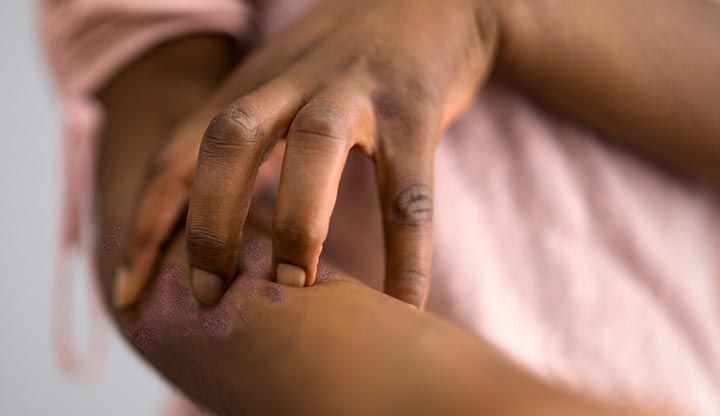Psoriasis on Black or brown skin looks different than it does on white skin. You may not see representations of psoriasis on dark skin in medical literature. While psoriasis looks different, symptoms of itchiness are the same. Treatment is available to help manage symptoms.

Psoriasis affects people of all races, including Black people, African Americans and people of color. Media representations of psoriasis often only show how it affects people with lighter skin tones. Psoriasis may cause a similar symptom of itchiness for everyone, but symptoms look different from person to person.
Psoriasis plaques are usually described as “pink to red.” These are characteristics of psoriasis on light skin tones. On dark skin tones, a psoriasis plaque can range from light to dark brown, purple or gray. Sometimes, skin discoloration isn’t visible on dark skin tones. Each type of psoriasis can look different based on the type and where it is on your body, but if you have a non-white skin tone, it’s unlikely that you’ll see pink or red skin discoloration as a symptom of psoriasis.
Psoriasis may also leave evidence of a flare-up on darker skin tones rather than on medium to light skin tones. While areas of thickened skin will disappear, discoloration from psoriasis plaques can remain on your skin for up to a year. Discoloration isn’t permanent, and a healthcare provider can offer treatment to speed up your body’s healing process.
There are several types of psoriasis that affect different parts of your body and have unique characteristics in addition to skin discoloration, including:
Plaque psoriasis looks different on medium to dark skin tones. While the description of a psoriasis plaque is usually “red,” redness doesn’t look the same on people of color as it does on people with light skin tones. You’ll most likely have a discolored patch of skin that could be a range of light to dark:
Scales and skin flakes caused by plaque psoriasis are usually silver on darker skin tones.
Advertisement
Cleveland Clinic is a non-profit academic medical center. Advertising on our site helps support our mission. We do not endorse non-Cleveland Clinic products or services. Policy
Scalp psoriasis occurs when plaques form on your scalp and at your hairline. This can cause temporary hair loss until your flare-up goes away. Your hair will regrow when your psoriasis symptoms clear up.
Yes. The effects of psoriasis on dark skin tones go beyond the physical symptoms and can affect your mental health. You may feel stressed or frustrated about your symptoms or your ability to receive an accurate diagnosis and effective treatment quickly. Diagnosis may take some time, as your physical symptoms may look similar to other common skin conditions. In addition, psoriasis can impact your self-esteem due to more visible changes to your skin than skin discoloration among people with lighter skin tones.
If your physical symptoms affect your mental health, you may find comfort in speaking with a mental health professional.
Yes, you could receive a misdiagnosis for psoriasis, but it’s not common. The main reason for misdiagnoses is because underrepresentation of skin conditions on dark skin tones in medical textbooks and educational material for healthcare providers.
Common conditions that look and feel similar to psoriasis that can lead to misdiagnosis include:
It’s possible to have more than one skin condition at a time, like eczema and psoriasis. If you believe you have a psoriasis misdiagnosis, meet with a healthcare provider who specializes in skin care, like a dermatologist.
Several options for psoriasis treatment are available because each person’s skin reacts to treatment differently. The best treatment option for you might not work as well for someone else. Common treatment options for psoriasis include:
Advertisement
There isn’t a specific treatment for psoriasis that works for everyone. Some studies have found that people with darker skin tones have more success with long-term psoriasis treatment, as signs of the skin plaque may last longer on dark skin tones than on light skin tones. Depending on the thickness of your psoriasis plaque, you may need a stronger dose of prescription medication to clear the plaque, but that isn’t exclusive to dark skin tones.
Symptoms of psoriasis can flare up if something in your environment triggers your immune system to overreact. You can manage common psoriasis triggers by:
If you have a flare-up of psoriasis that isn’t going away with usual treatment, visit your dermatologist. If psoriasis develops on a large area of your body, see your healthcare provider or dermatologist.
A note from Cleveland Clinic
Psoriasis is a common condition that affects all races and skin tones. And it can be frustrating to feel like your symptoms of psoriasis are severe because you don’t have a basis of comparison available during a quick internet search. While psoriasis is a condition that affects your skin, it can also affect your mental health. It’s normal to meet with a dermatologist several times before you find a treatment option that works best for your skin to help you feel better.
Last reviewed on 05/01/2023.
Learn more about the Health Library and our editorial process.
Advertisement
Cleveland Clinic is a non-profit academic medical center. Advertising on our site helps support our mission. We do not endorse non-Cleveland Clinic products or services. Policy